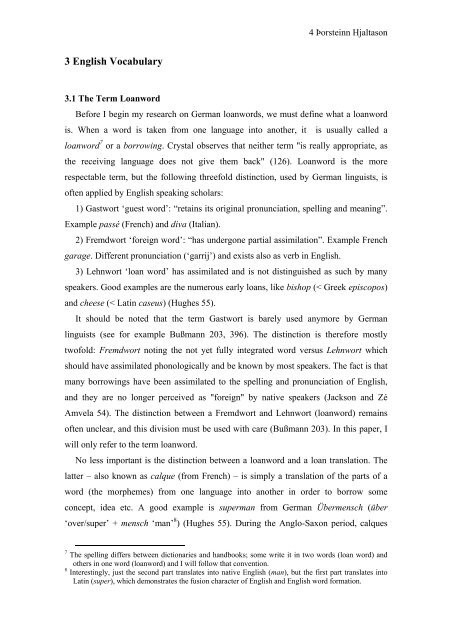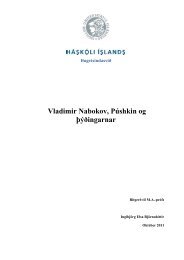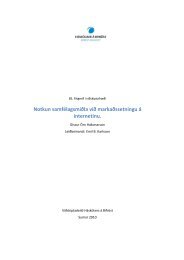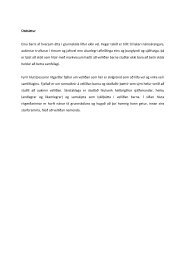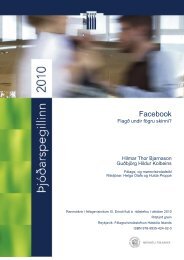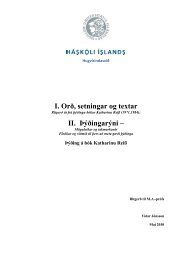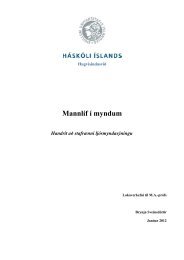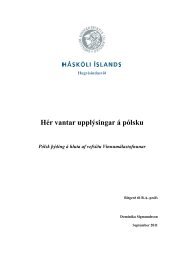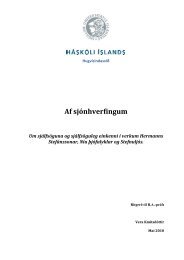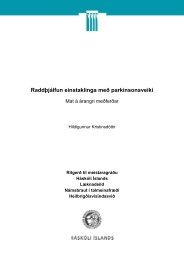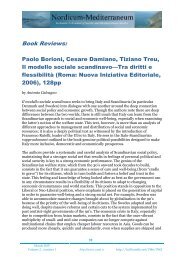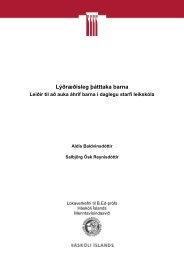Capturing the Zeitgeist Native German Loanwords in ... - Skemman
Capturing the Zeitgeist Native German Loanwords in ... - Skemman
Capturing the Zeitgeist Native German Loanwords in ... - Skemman
You also want an ePaper? Increase the reach of your titles
YUMPU automatically turns print PDFs into web optimized ePapers that Google loves.
3 English Vocabulary<br />
4 Þorste<strong>in</strong>n Hjaltason<br />
3.1 The Term Loanword<br />
Before I beg<strong>in</strong> my research on <strong>German</strong> loanwords, we must def<strong>in</strong>e what a loanword<br />
is. When a word is taken from one language <strong>in</strong>to ano<strong>the</strong>r, it is usually called a<br />
loanword 7 or a borrow<strong>in</strong>g. Crystal observes that nei<strong>the</strong>r term "is really appropriate, as<br />
<strong>the</strong> receiv<strong>in</strong>g language does not give <strong>the</strong>m back" (126). Loanword is <strong>the</strong> more<br />
respectable term, but <strong>the</strong> follow<strong>in</strong>g threefold dist<strong>in</strong>ction, used by <strong>German</strong> l<strong>in</strong>guists, is<br />
often applied by English speak<strong>in</strong>g scholars:<br />
1) Gastwort ‘guest word’: “reta<strong>in</strong>s its orig<strong>in</strong>al pronunciation, spell<strong>in</strong>g and mean<strong>in</strong>g”.<br />
Example passé (French) and diva (Italian).<br />
2) Fremdwort ‘foreign word’: “has undergone partial assimilation”. Example French<br />
garage. Different pronunciation (‘garrij’) and exists also as verb <strong>in</strong> English.<br />
3) Lehnwort ‘loan word’ has assimilated and is not dist<strong>in</strong>guished as such by many<br />
speakers. Good examples are <strong>the</strong> numerous early loans, like bishop (< Greek episcopos)<br />
and cheese (< Lat<strong>in</strong> caseus) (Hughes 55).<br />
It should be noted that <strong>the</strong> term Gastwort is barely used anymore by <strong>German</strong><br />
l<strong>in</strong>guists (see for example Bußmann 203, 396). The dist<strong>in</strong>ction is <strong>the</strong>refore mostly<br />
twofold: Fremdwort not<strong>in</strong>g <strong>the</strong> not yet fully <strong>in</strong>tegrated word versus Lehnwort which<br />
should have assimilated phonologically and be known by most speakers. The fact is that<br />
many borrow<strong>in</strong>gs have been assimilated to <strong>the</strong> spell<strong>in</strong>g and pronunciation of English,<br />
and <strong>the</strong>y are no longer perceived as "foreign" by native speakers (Jackson and Zé<br />
Amvela 54). The dist<strong>in</strong>ction between a Fremdwort and Lehnwort (loanword) rema<strong>in</strong>s<br />
often unclear, and this division must be used with care (Bußmann 203). In this paper, I<br />
will only refer to <strong>the</strong> term loanword.<br />
No less important is <strong>the</strong> dist<strong>in</strong>ction between a loanword and a loan translation. The<br />
latter – also known as calque (from French) – is simply a translation of <strong>the</strong> parts of a<br />
word (<strong>the</strong> morphemes) from one language <strong>in</strong>to ano<strong>the</strong>r <strong>in</strong> order to borrow some<br />
concept, idea etc. A good example is superman from <strong>German</strong> Übermensch (über<br />
‘over/super’ + mensch ‘man’ 8 ) (Hughes 55). Dur<strong>in</strong>g <strong>the</strong> Anglo-Saxon period, calques<br />
7 The spell<strong>in</strong>g differs between dictionaries and handbooks; some write it <strong>in</strong> two words (loan word) and<br />
o<strong>the</strong>rs <strong>in</strong> one word (loanword) and I will follow that convention.<br />
8 Interest<strong>in</strong>gly, just <strong>the</strong> second part translates <strong>in</strong>to native English (man), but <strong>the</strong> first part translates <strong>in</strong>to<br />
Lat<strong>in</strong> (super), which demonstrates <strong>the</strong> fusion character of English and English word formation.


